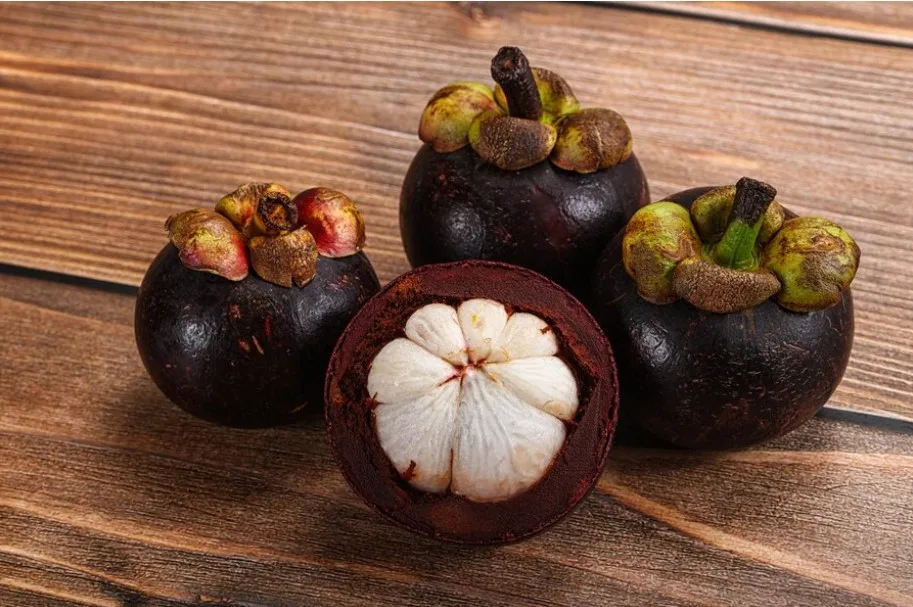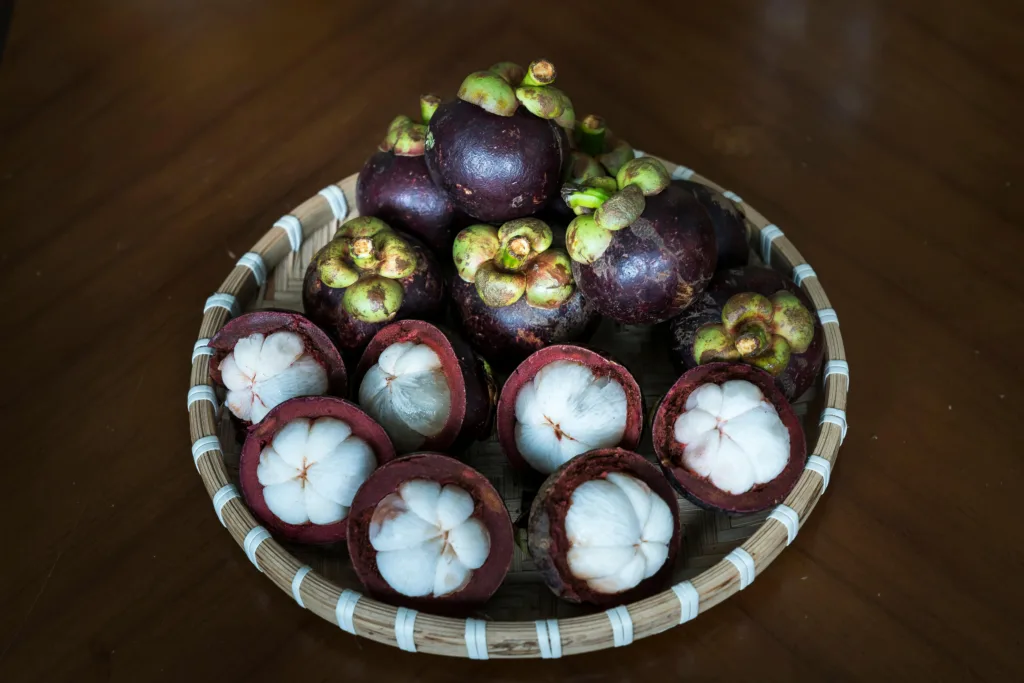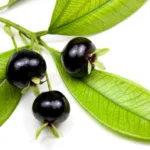Mangosteen, often hailed as the “Queen of Fruits,” is a tropical fruit native to Southeast Asia. Known for its delicious taste and rich nutritional profile, mangosteen offers numerous health benefits. This article explores the health advantages and various uses of mangosteen, providing a detailed insight into why this fruit deserves a place in your diet.
Nutritional Profile of Mangosteen
Mangosteen is packed with essential nutrients, including vitamins, minerals, and antioxidants. A typical serving of mangosteen (one cup) provides:
- Calories: 143
- Carbohydrates: 35 grams
- Fiber: 3.5 grams
- Vitamin C: 12% of the Daily Value (DV)
- Magnesium: 6% of the DV
The fruit is also rich in xanthones, a type of plant compound with strong antioxidant properties, which play a crucial role in its health benefits.

Health Benefits of Mangosteen
1. Rich in Antioxidants
Mangosteen is a powerhouse of antioxidants, particularly xanthones. These compounds help neutralize harmful free radicals, reducing oxidative stress and protecting the body against chronic diseases like cancer and heart disease.
2. Anti-Inflammatory Properties
Xanthones in mangosteen also possess anti-inflammatory properties. They inhibit the production of inflammatory cytokines, helping to reduce inflammation in the body. This makes mangosteen beneficial for individuals with inflammatory conditions such as arthritis.
3. Boosts Immune System
The high vitamin C content in mangosteen strengthens the immune system by enhancing the function of white blood cells. Regular consumption of mangosteen can help your body fight off infections and illnesses more effectively.
4. Promotes Healthy Skin
Mangosteen’s antioxidants help protect the skin from damage caused by free radicals and environmental factors. Its anti-inflammatory properties also reduce the occurrence of acne and other skin conditions. Additionally, mangosteen is believed to have anti-aging effects, keeping your skin youthful and radiant.
5. Supports Heart Health
Mangosteen contributes to heart health in several ways. The fruit’s high fiber content helps lower cholesterol levels, while its potassium content aids in maintaining healthy blood pressure. The anti-inflammatory and antioxidant properties of xanthones also protect the cardiovascular system from damage.
6. Aids in Weight Loss
Mangosteen is low in calories and high in fiber, making it an excellent choice for those looking to lose weight. The fiber content promotes a feeling of fullness, reducing overall calorie intake. Additionally, mangosteen’s antioxidants may enhance fat metabolism, further aiding weight loss efforts.
7. Improves Digestive Health
The dietary fiber in mangosteen supports healthy digestion by promoting regular bowel movements and preventing constipation. The fruit also contains compounds that have been shown to possess anti-ulcer properties, protecting the stomach lining and improving overall digestive health.
8. Enhances Mental Health
Preliminary studies suggest that the antioxidants and anti-inflammatory compounds in mangosteen may have neuroprotective effects, potentially enhancing mental health. These compounds could help reduce the risk of neurodegenerative diseases like Alzheimer’s and Parkinson’s, and improve overall cognitive function.
9. Regulates Blood Sugar Levels
Mangosteen has been found to help regulate blood sugar levels, making it beneficial for individuals with diabetes or at risk of developing diabetes. Its fiber content slows the absorption of sugar into the bloodstream, while its antioxidants help improve insulin sensitivity.
10. Promotes Healthy Gums
The anti-inflammatory and antimicrobial properties of mangosteen can also promote oral health. Consuming mangosteen may help reduce gum inflammation, combat oral bacteria, and support overall dental health.

Uses of Mangosteen
1. Culinary Uses
Mangosteen can be enjoyed in various culinary applications. Here are some popular ways to incorporate this delicious fruit into your diet:
- Fresh Consumption: Mangosteen can be eaten fresh as a snack. Simply peel the thick rind and enjoy the juicy, sweet segments inside.
- Smoothies: Blend mangosteen with other fruits like bananas, strawberries, or mangoes to create a refreshing and nutritious smoothie.
- Salads: Add mangosteen segments to fruit or green salads for a tropical twist.
- Desserts: Use mangosteen as a topping for desserts like yogurt, ice cream, or cakes to enhance their flavor and nutritional value.
2. Traditional Medicine
In traditional medicine, various parts of the mangosteen plant have been used for their therapeutic properties:
- Mangosteen Rind: The rind is often dried and ground into a powder to make teas or supplements believed to treat diarrhea, dysentery, and skin infections.
- Mangosteen Leaves and Bark: These parts of the plant are used in decoctions to alleviate fever, sore throats, and urinary tract infections.
3. Cosmetic Products
Due to its antioxidant and anti-inflammatory properties, mangosteen is a popular ingredient in cosmetic products. It is used in creams, lotions, and serums to promote healthy, youthful skin. The fruit’s natural compounds help reduce inflammation, combat acne, and protect the skin from environmental damage.
4. Dietary Supplements
Mangosteen extract is available in supplement form, including capsules, powders, and juices. These supplements are marketed for their potential health benefits, such as boosting the immune system, reducing inflammation, and improving skin health.
Potential Side Effects and Precautions
While mangosteen offers numerous health benefits, it is important to consume it in moderation. Overconsumption can lead to certain side effects, including:
- Digestive Issues: Excessive intake of mangosteen may cause gastrointestinal discomfort, such as bloating and diarrhea, due to its high fiber content.
- Interference with Medications: Mangosteen may interact with certain medications, such as anticoagulants. If you are taking any medications, consult your healthcare provider before adding mangosteen to your diet.
Conclusion
Mangosteen is a nutritious and versatile fruit with a rich history in traditional medicine and modern health practices. Its impressive array of antioxidants, vitamins, and minerals contribute to numerous health benefits, including improved immune function, heart health, and skin vitality. Whether enjoyed fresh, added to smoothies, or used in traditional remedies, mangosteen is a valuable addition to a healthy lifestyle. However, as with any supplement or dietary change, it’s essential to consume mangosteen in moderation and consult with a healthcare professional if you have any underlying health conditions or are taking medication.
By incorporating mangosteen into your diet, you can enjoy its delicious taste and reap the numerous health benefits it offers, making it a true “Queen of Fruits” in both flavor and nutritional value.
Topics covered
- What is Mangosteen?
- What are key nutrients in Mangosteen?
- What are health benefits of Mangosteen?
- What are uses of Mangosteen?
- Side effect of Mangosteen.
- Precautions to be taken while eating Mangosteen.








4 thoughts on “Mangosteen: The Queen of Fruits & Its 10 Powerful Health Benefits”